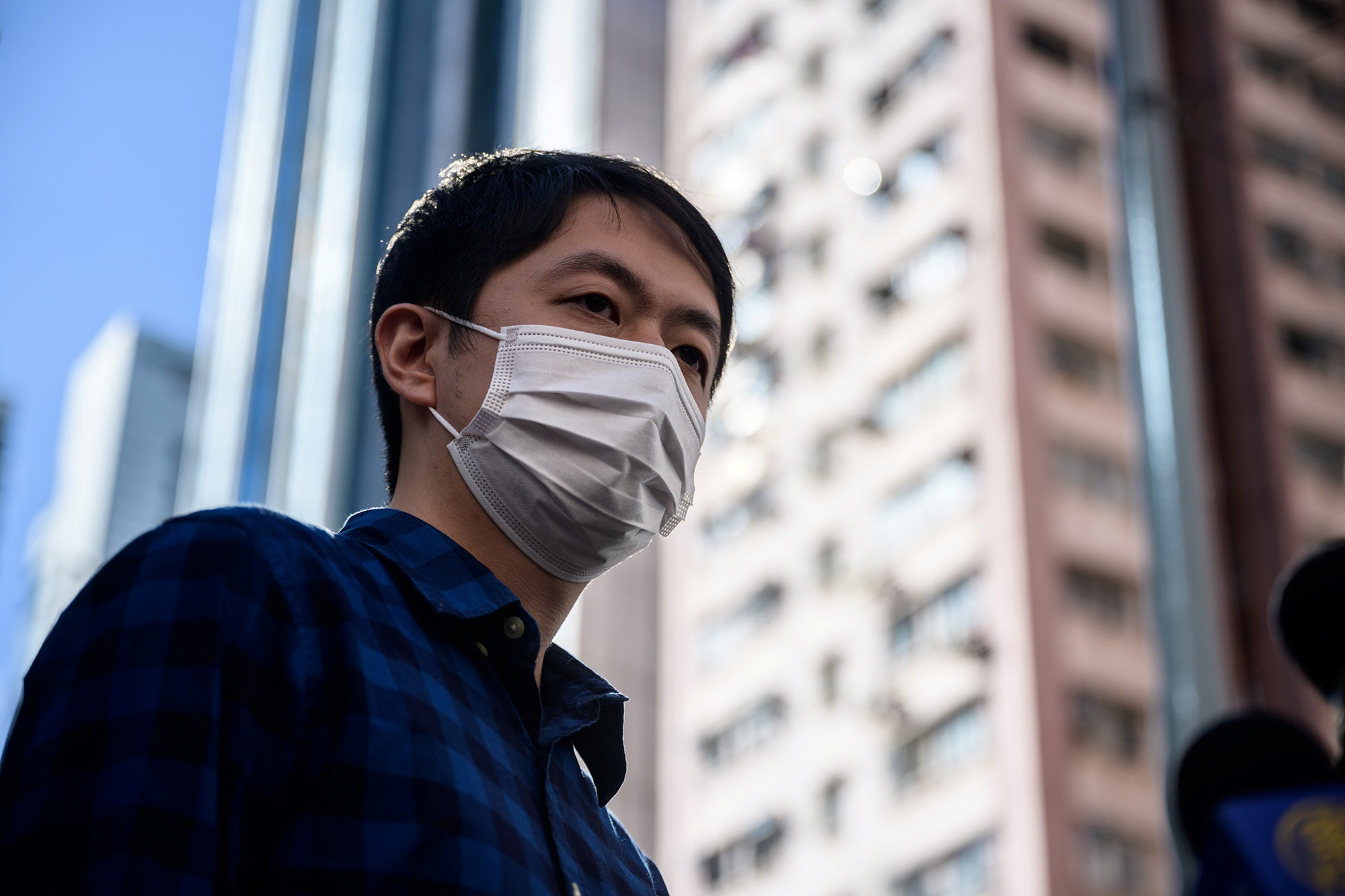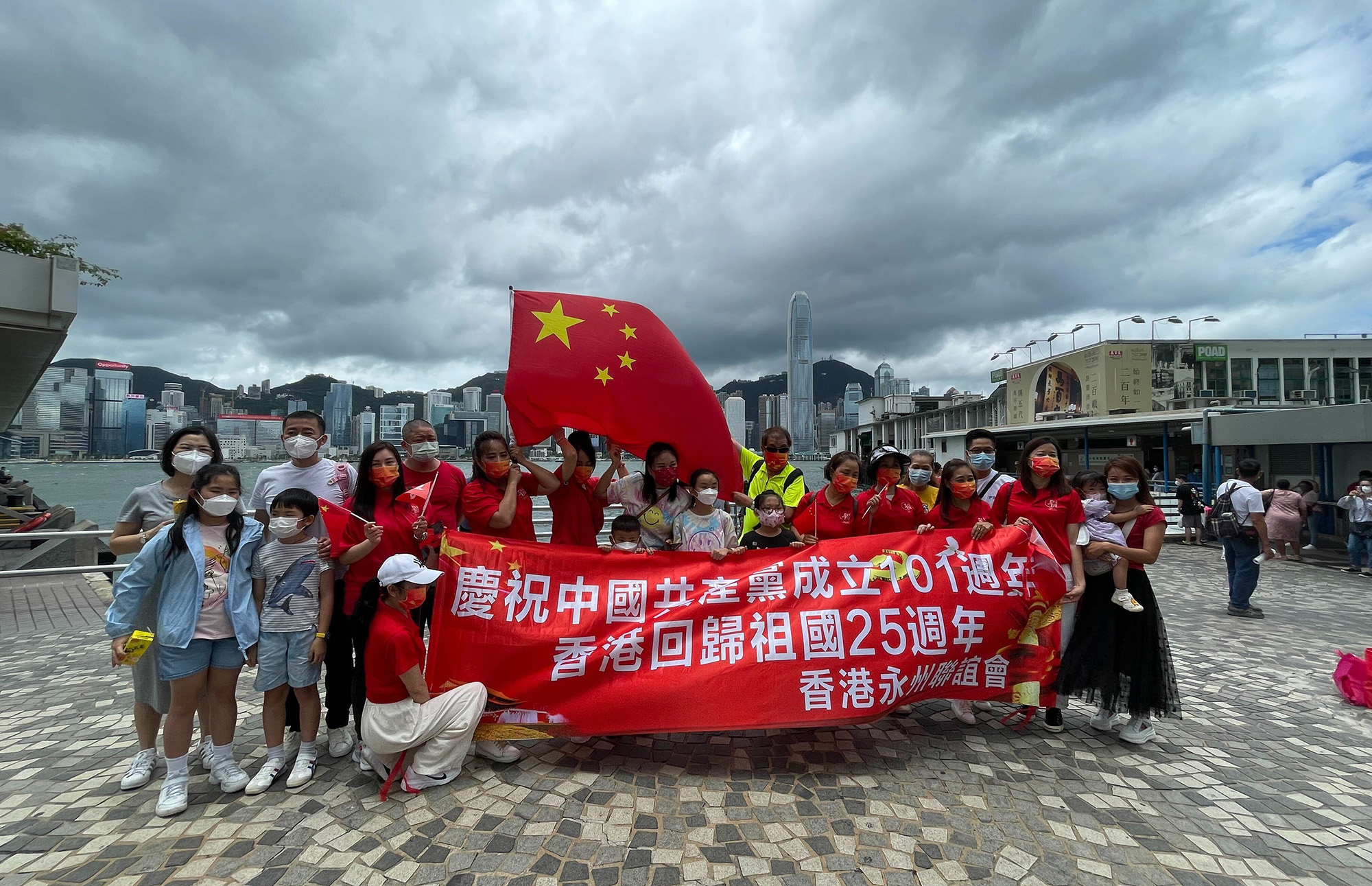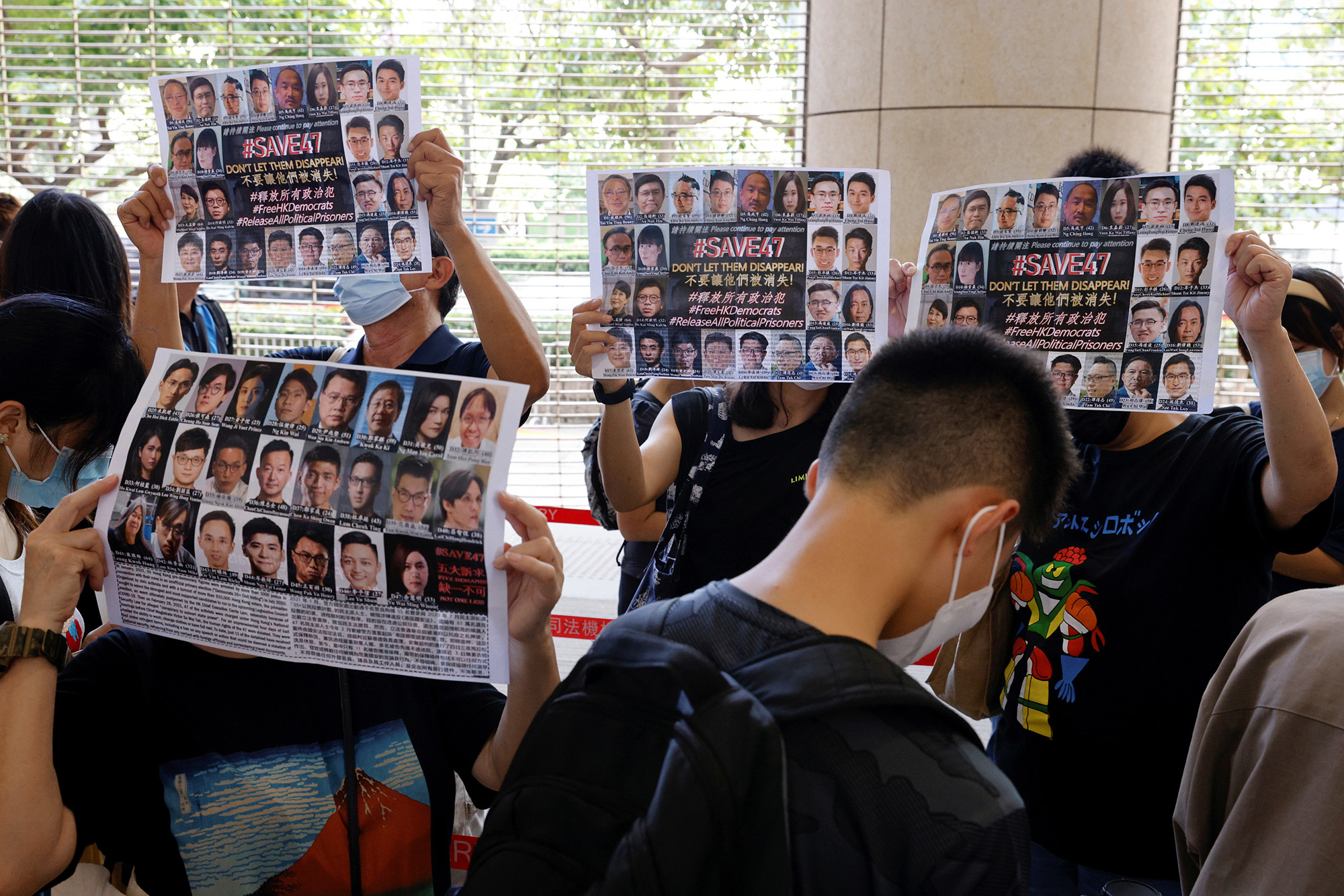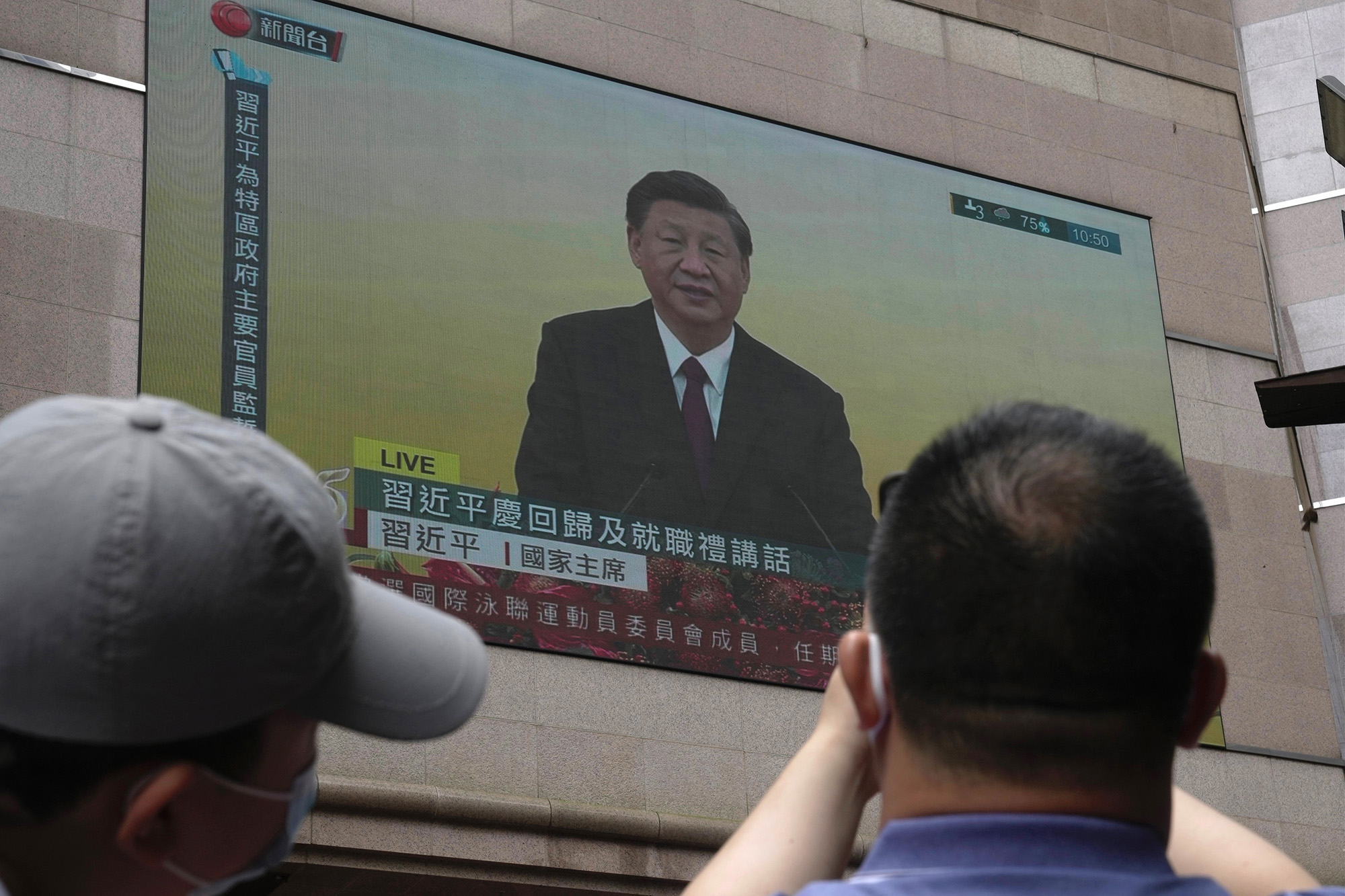Our live coverage of Hong Kong's 25th handover anniversary has ended. For the latest developments read here.
Hong Kong marks 25th handover anniversary
By Helen Regan, Jessie Yeung and Kathleen Magramo, CNN
Hong Kong political activists in exile yearn for the city they left behind
From CNN's Kathleen Magramo in Hong Kong

Hong Kong pro-democracy activists and former lawmakers, many of whom are now living in self-imposed exile abroad, have been sharing their hopes and struggles on the 25th handover anniversary.
Fugitive former opposition lawmaker Ted Hui, now based in Australia, said in a Facebook post Friday that "freedom and rule of law are dead" in Hong Kong.
Hui left the city in 2020 while on bail, dodging charges of perverting the course of justice, access to a computer with dishonest intent, and vandalism — charges he says are politically motivated.
Hui said the anger in his heart "was never extinguished."
"I feel so strongly about Hong Kong as if I’ve never left: I can’t let go of the place I love, and I can’t let go of my comrades in prison," he wrote.
"Hong Kong currently has more than 1,000 political prisoners, in addition to a justice system destroyed by the evil national security law, as well as the total annihilation of free press and democratic society."
Another former lawmaker and prominent activist Nathan Law, who fled Hong Kong for the United Kingdom in 2020, said the city he once knew has become "unrecognizable."
The 28-year-old, who helped lead the 2014 Umbrella Movement, lives in self-imposed exile but continues to yearn for his hometown.
“The feeling that this piece of land brings is irreplaceable," he said in a Facebook post on Thursday.
During his two years in the UK, he said he has moved houses five times and lived in the constant shadow of anxiety.
“We exist in struggles and in between the cracks: we left to move towards a promised and ideal Hong Kong. After becoming estranged, we look back at the city that retains its glamorous facade, but this 'new Hong Kong' has lost its resonances, we are still yearning to go back [to our old Hong Kong],” he said.
Hong Kong activist and Washington-based historian Jeffrey Ngo said the city's continued fight for democracy rests on its growing diaspora.
With more and more Hong Kong residents opting to emigrate using the British National (Overseas) passport scheme, as well as new immigration pathways laid out by Canada and Australia, Ngo believes the democracy movement needs to be coordinated between those who have left the city.
“Moving forward, [the political movement] will have to be done by people who are prepared to not return to Hong Kong, because the [Hong Kong] national security law claims jurisdiction all around the world,” Ngo told CNN.
Some context: The wording of Hong Kong's national security law also applies to offenses committed "outside the region" by foreigners who are not residents of Hong Kong or mainland China.
Chinese leader Xi Jinping leaves Hong Kong
Chinese leader Xi Jinping and his wife Peng Liyuan have departed Hong Kong for mainland China after attending the inauguration ceremony of the city's new Chief Executive John Lee, Chinese state news agency Xinhua reported.
They were seen off by Lee from the city's West Kowloon train station, which connects Hong Kong to the mainland by high-speed rail.
Crowds waving Chinese flags gathered at the station for their departure, as seen on a live video feed provided by the Hong Kong government.
Here's how some Hong Kongers are spending the July 1 holiday
From CNN's Kathleen Magramo

In Hong Kong's Tsim Sha Tsui district, just across the water from where the formal handover anniversary ceremonies were held, a group of about 30 people gathered to hold up the Chinese national flag and a patriotic banner.
Martin Chan, who was accompanied by his wife and two children, was among the group braving the stormy weather to take advantage of the public holiday.
Chan said his children lived through the 2019 anti-government protests but were still too young to understand why they happened.
“What’s important is that Hong Kong is stable and safe now,” he said. “We need to respect each other, despite any differences, and also respect mainland China.”
His 11-year-old daughter said they conduct flag raising ceremonies at her school.
Hong Kong resident Ronald Kwong said his 3-year old daughter recognizes the Chinese national flag and has learned the first few lines of “March of the Volunteers” — the national anthem.
“She’s too young to go to school but she picked it up from watching the daily news channels,” Kwong said as he took his wife, daughter and son for lunch nearby.
Some context: After Beijing imposed the national security law in Hong Kong in 2020, the city’s education authorities issued a set of guidelines for schools to adopt "patriotic education."
Kindergartens — both private and public — will be expected to instill in their students a greater knowledge of “Chinese history, Chinese culture, and moral education,” which the guidelines say will “gradually build up students’ identity as a Chinese and thus lay the foundation for national security education.”
Beginning at age 6, all students in Hong Kong will receive new lessons aimed at helping them “understand the country’s history and development, the importance of national security, the national flag, national emblem and national anthem.”
Xi Jinping is about to return to mainland China after a flying visit to Hong Kong
Chinese leader Xi Jinping returned to Hong Kong's West Kowloon rail station on Friday, ready to head back to mainland China after a flying visit to mark the 25th handover anniversary.
Former Hong Kong Chief Executive Carrie Lam was there to greet Xi on his arrival to the city on Thursday. Xi was accompanied by Hong Kong's new leader John Lee as he prepared to leave.
Analysis: John Lee praised Hong Kong's judicial system. But 47 pro-democracy figures face life behind bars
Analysis from CNN staff

In his inauguration speech Friday, Hong Kong's new leader John Lee said the city's judicial system was "the envy of many European and American countries."
However, since the introduction of a national security law in 2020, the Hong Kong government has cracked down on the city's pro-democracy groups and opposition figures, raising fears its judiciary and political system could face similar repression.
- The Hong Kong 47: Forty-seven pro-democracy figures, including activists, elected lawmakers, district councilors and academics between the ages of 23 and 64 were charged with subversion in 2021 and face trial for allegedly violating the city's national security law. They include prominent activist Joshua Wong and law professor Benny Tai. It's the city’s largest national security case and most of the defendants are being held in pre-trial detention, having been denied bail. The offense carries a maximum penalty of life imprisonment.
- Sweeping escalation: Their case marked a sweeping escalation in the application of the national security law, under which previously only a handful of people had been charged and taken to court. Prosecutors had argued in court that the defendants were involved in a “massive and well-organized scheme to subvert the Hong Kong government” by organizing and participating in an unofficial primary election. Such contests are a normal function in democracies around the world, during which political parties select the strongest candidates for an election.
- Accusations of conspiracy: Hong Kong authorities accused the 47 of conspiring to use the primary to win a majority in the legislature and paralyze the government, potentially forcing the city’s leader to resign. That strategy would be entirely legal — and not out of the ordinary — in parliamentary systems like the United Kingdom and Australia.
- National security law: The law criminalizes secession, subversion, terrorism, and collusion with foreign powers, and carries with it a maximum sentence of life in prison. Cases under the law are handled by a dedicated branch of the Hong Kong police and judges assigned to hear national security cases. Critics of the legislation say it has been used to silence all dissent against the Hong Kong government, which has repeatedly defended the law, saying it restored order to the city following the 2019 protests.
Xi Jinping visits Chinese military garrison in Hong Kong
From CNN's Jadyn Sham in Hong Kong
Chinese leader Xi Jinping visited the Hong Kong garrison of the People's Liberation Army (PLA), police told CNN.
His visit comes after presiding over the inauguration ceremony of the city's new Chief Executive John Lee on Friday.
The PLA maintains a garrison in Hong Kong, but its activities are largely low-profile. Under the Asian financial hub's mini-constitution, the Basic Law, defense and foreign affairs are managed by Communist Party leaders in Beijing.
In January, China appointed a former paramilitary chief, Peng Jingtang, as the new commander of the PLA garrison in Hong Kong, state broadcaster CCTV reported, citing the PLA's spokesman.
New Hong Kong leader promises to boost economy but fails to address Covid restrictions
From CNN's Laura He
Hong Kong’s new Chief Executive John Lee on Friday vowed to strengthen the city’s advantage as a financial hub and build new industries.
The former British colony’s reputation as an international financial center has been battered during the past two years due to its continued adherence to Beijing's unbending zero-Covid policies.
At his inauguration speech, delivered in Mandarin, Lee said he would “consolidate” the city’s “inherent advantageous industries.”
Apart from enhancing Hong Kong’s current position in finance and shipping, Lee said his government will also build up the city’s technology and innovation industries.
“We will develop emerging industries, and build Hong Kong into an international innovation center,” Lee said, while addressing a gathering of top officials, including Chinese leader Xi Jinping.
During his speech, Lee extolled China’s Belt and Road and Greater Bay Area initiatives, which he said have given Hong Kong “unlimited opportunities and unlimited development space.”
Notably, Lee failed to address growing pushback against the city's controversial Covid policies, or whether his government would look to break from Beijing and loosen restrictions and border controls.
“We will scientifically and precisely control the coronavirus epidemic, strengthen the medical system’s adaptability, and strengthen the care of the elderly and young," said Lee, who did not provide a timetable for these measures.
Some context: For years, Hong Kong has been seen an important gateway to mainland China and an East-West conduit for global business.
But its future has been called into question by China’s moves to further erode the city’s autonomy — including the introduction of a national security law— and a growing exodus of talent due to rigid Covid rules.
Chinese leader Xi says he has "4 wishes" for Hong Kong

During his speech marking the 25th anniversary of the handover, Chinese leader Xi Jinping also laid out his “four wishes” for the city's future as follows:
- Enhance the local government: The city's leader and government should be committed to realizing the “one country, two system” framework and upholding its mini-constitution, known as the Basic Law, Xi said. He added that public servants should be of a “high moral standard” and dedicated to Hong Kong and helping its people better understand the nation and the world.
- Continue development: Hong Kong should tap into mainland Chinese initiatives like the Belt and Road overseas infrastructure and development drive, the nation's 14th five-year plan, and the Greater Bay Area scheme, which aims to connect Hong Kong with hubs in neighboring Guangdong province, according to Xi. It should also bolster international business exchanges and cooperation, he said.
- Solve social issues: The government should focus on improving people's livelihoods in areas such education, housing, care for the elderly and job opportunities, Xi said.
- Protect "harmony and stability": Hong Kong cannot afford chaos and must focus on development regardless of interference, Xi said, adding that all people, as long as they uphold Hong Kong laws and "one country, two systems," could contribute to society.